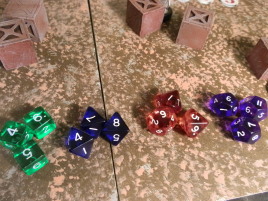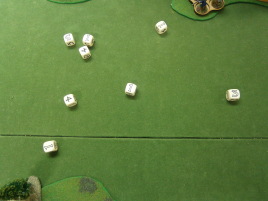Binomial Distribution in Gaming
Or What Are My Chances of Rolling Three Successes?
The Editor
Introduction
 We all love buckets of dice. They have a nice tactile feel, rolling
loads of dice for an attack really gives the impression of power and
generally it's easy to pick out the successes to determine the
outcome. Gamers just love dice, and so do game designers.
We all love buckets of dice. They have a nice tactile feel, rolling
loads of dice for an attack really gives the impression of power and
generally it's easy to pick out the successes to determine the
outcome. Gamers just love dice, and so do game designers.
But what are your odds, really? Let's find out.
Elementary Probability, My Dear Watson
 Let's get some definitions out of the way first. We're talking about
multiple identical tests rolled at the same time. Those tests may be
sequential like the well known
hit-wound-save
-cycle, but each test could be rolled in isolation, they do not
directly affect each other.
Let's get some definitions out of the way first. We're talking about
multiple identical tests rolled at the same time. Those tests may be
sequential like the well known
hit-wound-save
-cycle, but each test could be rolled in isolation, they do not
directly affect each other.
Working out the probability of success for a single test is pretty
basic probability math and should be no problem for anyone who wasn't
completely comatose during high school math class. You can
even resort to counting the die faces in a pinch and still arrive at
the correct result.
Even working out the expected number of successes is easy, all it
takes is some simple multiplication. You'd expect to get five tails
on ten coin flips. Sometimes this knowledge is enough and the more
dice you are rolling, the more likely the result is to be close to the
expected value.
But what if you really need to take all of those orcs out right
now? Or what if you're using one of those new-fangled modern rule
system where the dice rolls are individual but final result is
determined by the total amount of successes rolled? What are your odds
for rolling three or more successes?
Enter The Binomials
The problem, ofcourse, is that there's multiple ways to e.g. roll
two or more successes on four dice. You might get more successes than
required, and the successes may be on different dice. If you don't
account for all the possibilities, your calculation is bound to be
wrong.
 Calculating chances like this is possible using just classical
probability math, but it is cumbersome as the number of combinations
increases with more dice. Two or three dice is okay, but with four or
more you're just brute forcing the solution for no good reason. I
know, I've done it myself. The only really good thing about that is
that you can do it with just pen and paper.
Calculating chances like this is possible using just classical
probability math, but it is cumbersome as the number of combinations
increases with more dice. Two or three dice is okay, but with four or
more you're just brute forcing the solution for no good reason. I
know, I've done it myself. The only really good thing about that is
that you can do it with just pen and paper.
The solution is still high school math, but admittedly somewhat
advanced high school math. Quite frankly, I think this is above and
beyond the level most game designers were paying attention to in
school and sometimes you can see it in rules designs that behave oddly
in some corner cases.
The mathematical concepts involved are
combinatorics and even further
binomial distribution. I'm not going to regurgitate
the basics here. You can find excellent reading behind the links
above.
Luckily, once you understand the problem excellent tools are
available. There is no longer need to get a
MatLab license or even to learn to use it. Even the
humble Excel has
BINOM.DIST function available.
The Tool To End All Tools
 I wrote the following Excel sheet to help calculate the odds for
multiple successes in a handy-dandy table format. All you need to do
is figure out your odds for a single success and the table will
automatically show all the odds for 1 to 20 dice. And if you really
need the more, extending the table is not
rocket science.
I wrote the following Excel sheet to help calculate the odds for
multiple successes in a handy-dandy table format. All you need to do
is figure out your odds for a single success and the table will
automatically show all the odds for 1 to 20 dice. And if you really
need the more, extending the table is not
rocket science.
The numbers shown are rounded for display purposes, but a dash is an exact
zero -- you can't roll three successes on two dice.
Here's the file for your enjoyment:
Just think of me fondly when using it. And remember, I didn't
invent the laws of probability, I'm just telling you about them. You
can disagree with me, but disagreeing with probability is like
disagreeing with gravity.
There's a reason they're not called the Opinions of Probability.
Caveat emptor: I am still only human and prone to errors. I
am also not a statistician, though I did work with them at
National Office of
Statistics for a number of years. Now my former collegues will
probably hunt me down and make me recite deciles and outliers for this
egregious crime against statistical purity...

This work is licensed under a Creative Commons Attribution-NonCommercial-NoDerivs 2.5 License.
Copyright 2003-2021 Mikko Kurki-Suonio
 We all love buckets of dice. They have a nice tactile feel, rolling
loads of dice for an attack really gives the impression of power and
generally it's easy to pick out the successes to determine the
outcome. Gamers just love dice, and so do game designers.
We all love buckets of dice. They have a nice tactile feel, rolling
loads of dice for an attack really gives the impression of power and
generally it's easy to pick out the successes to determine the
outcome. Gamers just love dice, and so do game designers.
 Let's get some definitions out of the way first. We're talking about
multiple identical tests rolled at the same time. Those tests may be
sequential like the well known
Let's get some definitions out of the way first. We're talking about
multiple identical tests rolled at the same time. Those tests may be
sequential like the well known
 Calculating chances like this is possible using just classical
probability math, but it is cumbersome as the number of combinations
increases with more dice. Two or three dice is okay, but with four or
more you're just brute forcing the solution for no good reason. I
know, I've done it myself. The only really good thing about that is
that you can do it with just pen and paper.
Calculating chances like this is possible using just classical
probability math, but it is cumbersome as the number of combinations
increases with more dice. Two or three dice is okay, but with four or
more you're just brute forcing the solution for no good reason. I
know, I've done it myself. The only really good thing about that is
that you can do it with just pen and paper.
 I wrote the following Excel sheet to help calculate the odds for
multiple successes in a handy-dandy table format. All you need to do
is figure out your odds for a single success and the table will
automatically show all the odds for 1 to 20 dice. And if you really
need the more, extending the table is not
I wrote the following Excel sheet to help calculate the odds for
multiple successes in a handy-dandy table format. All you need to do
is figure out your odds for a single success and the table will
automatically show all the odds for 1 to 20 dice. And if you really
need the more, extending the table is not
 Sucks!
Sucks!
